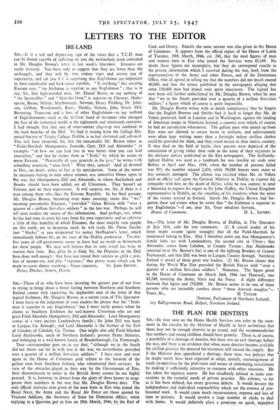SIR,—Those of us who have been devoting the greater part
of our lives to trying to bring about a better feeling between Northern and Southern Ireland cannot help regretting the deplorable tone of the letter of that typical Irishman, Mr. Douglas Brown, in a recent issue of The Spectator. I must leave to the judgement of your readers the phrase that the " Irish- man is superior to any Englishman," but I must really protest when he claims as Southern Irishmen the well-known Ulstermen who are our great Field-Marshals Montgomery, Dill and Alexander. Lord Montgomery comes of a very ancient Londonderry family ; Sir John Dill was born at Lurgan, Co. Armagh ; and Lord Alexander is the brother of the Earl of Caledon, of Caledon, Co. Tyrone. One might also add Field-Marshal Lord Alanbrooke, uncle of Northern Ireland's present Prime Minister, and belonging to a well-known family of Brookeborough, Co. Fermanagh.
Your correspondent goes on to say that, "although we in the South did not throw our lot in with you in the war, we nevertheless provided over a quarter of a million first-class soldiers." I have over and over again in the House of Commons paid tribute to the heroism of the gallant men from Southern Ireland, who volunteered their services. In view of the obstacles placed in their way by the Government of Eire, their determination to enlist in the British Army cannot be too highly praised. It is, however, to detract from the glory of these heroes to exag- gerate their numbers in the way that Mr. Douglas Brown does. The only official statistics ever given of the men born in Eire who joined the Royal Navy, the Army and the Royal Air Force are those quoted by Viscount Addison, the Secretary of State for Dominion Affairs, when ;eplyipg„to, k Question. ran to_ him on 19th March, 1946, by, the Earl of Cork and Orrery. Exactly the same answer was also given in the House of Commons. It appears from the official report of the House of Lords of Tuesday, 19th March, 1946, col. 241, that the total figures of men and women born in Eire who joined the Services were 43,249. No doubt these figures are incomplete, but they do correspond exactly to the private information which I received during the war, both from the representatives of the Army and other Forces, and of the Dominions Office, who all agreed in telling me that the numbers did not much exceed 40,000, and that the letters published in the newspapers alleging that some 150,000 men had joined were quite inaccurate. The legend has now been still further embellished by Mr. Douglas Brown, when he says that ” we in the South provided over a quarter of a million first-class soldiers," a figure which of course is quite impossible.
Mr. Douglas Brown writes with so much complacency that he forgets that the English Browns and Smiths find it hard to forget that Mr. de Valera protested, both in London and in Washington, against the landing of American troops in Northern Ireland, a country over which, of course, he had no jurisdiction whatsoever. The gallant men who joined up from Eire were not allowed to return home in uniform, and unfortunately were often kept waiting more than a fortnight before civilian clothes could be provided for them, and they could return to their native country. If they died on the field of battle, their parents were depriyed of the consolation of giving either their rank or the name of their regiment in the obituary notices published in the Eire newspapers. The brilliantly- lighted Dublin was used as a landmark for two terrible air raids over Belfast in April and May, 1941, when the number of persons killed was 955, the number injured 2,436, while 39,080 houses were more or less seriously damaged. The climax was reached when Mr. de Valera paid an official call upon the German Minister in Dublin to express his „ sympathy with him on the death of Hitler, while he was content to send a Secretary to express his regret to Sir John Maffey, the United Kingdom representative in Dublin, on the smashing of his windows when the news of the victory arrived in Ireland. Surely Mr. Douglas Brown had for- gotten these sad events when he wrote that " the Irishman is superior to any Englishman."—I ant, dear Sir, Your obedient Servant,


































 Previous page
Previous page